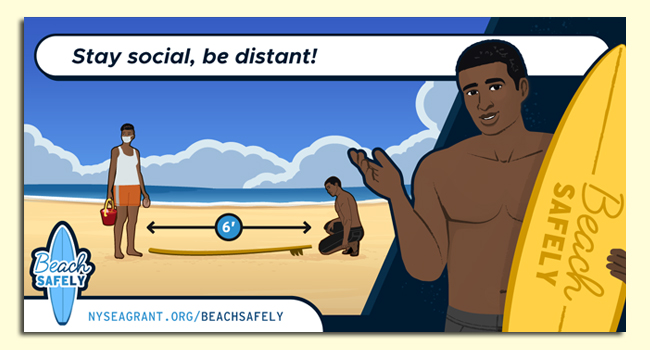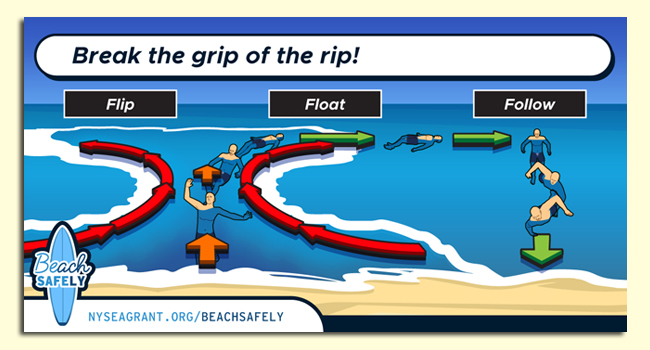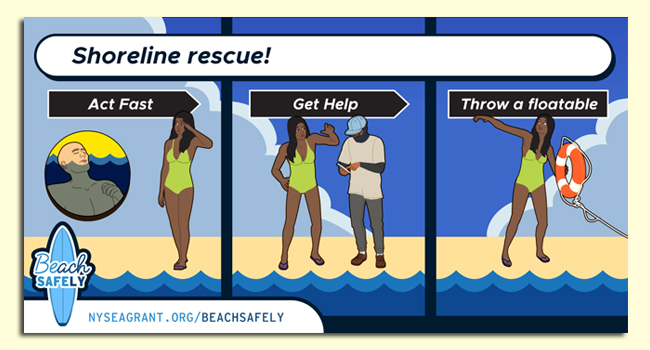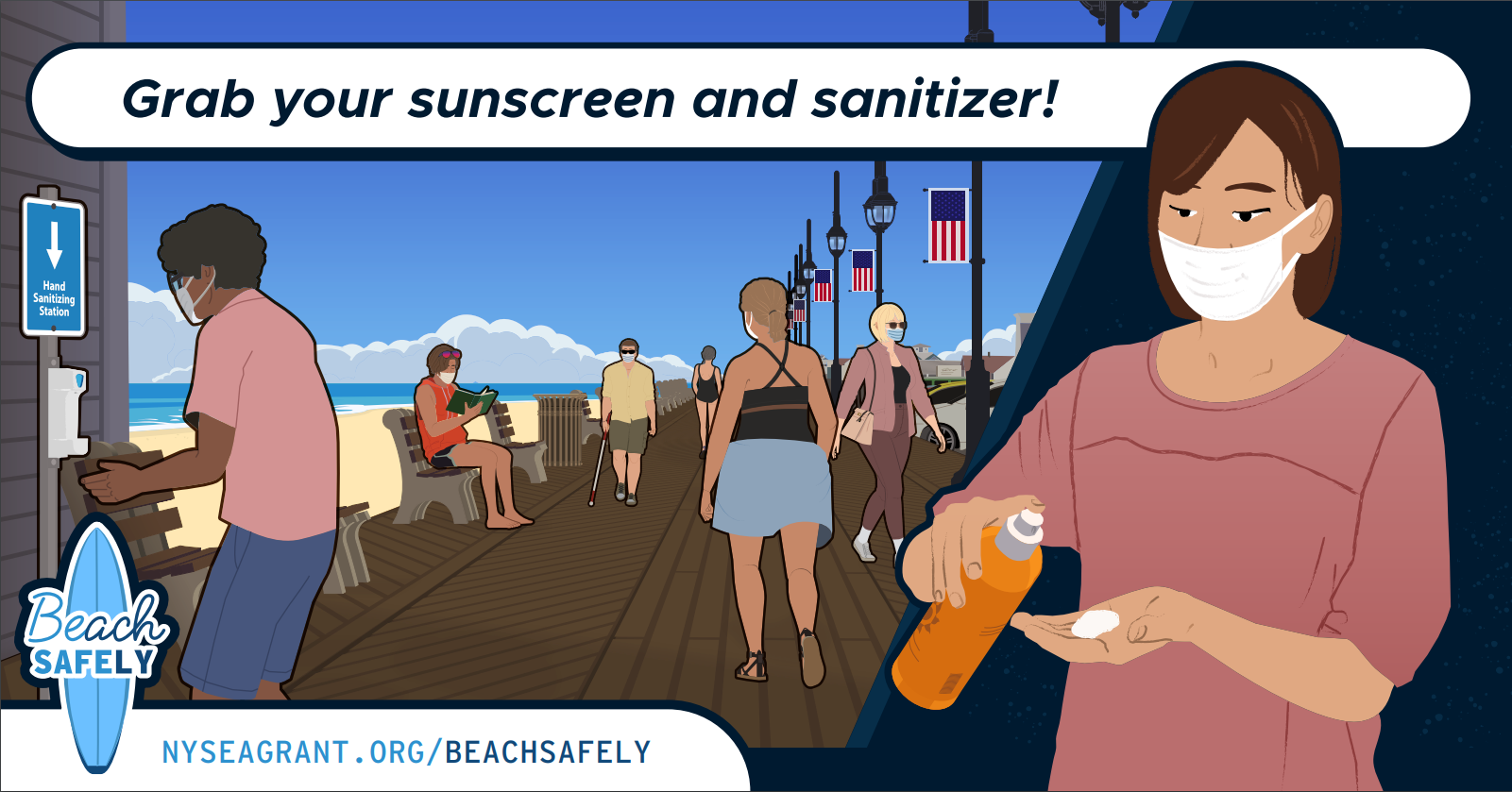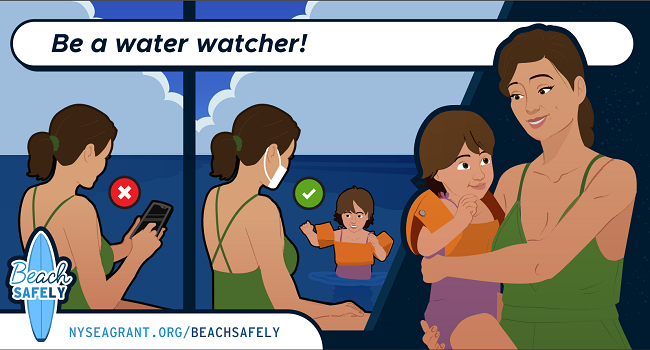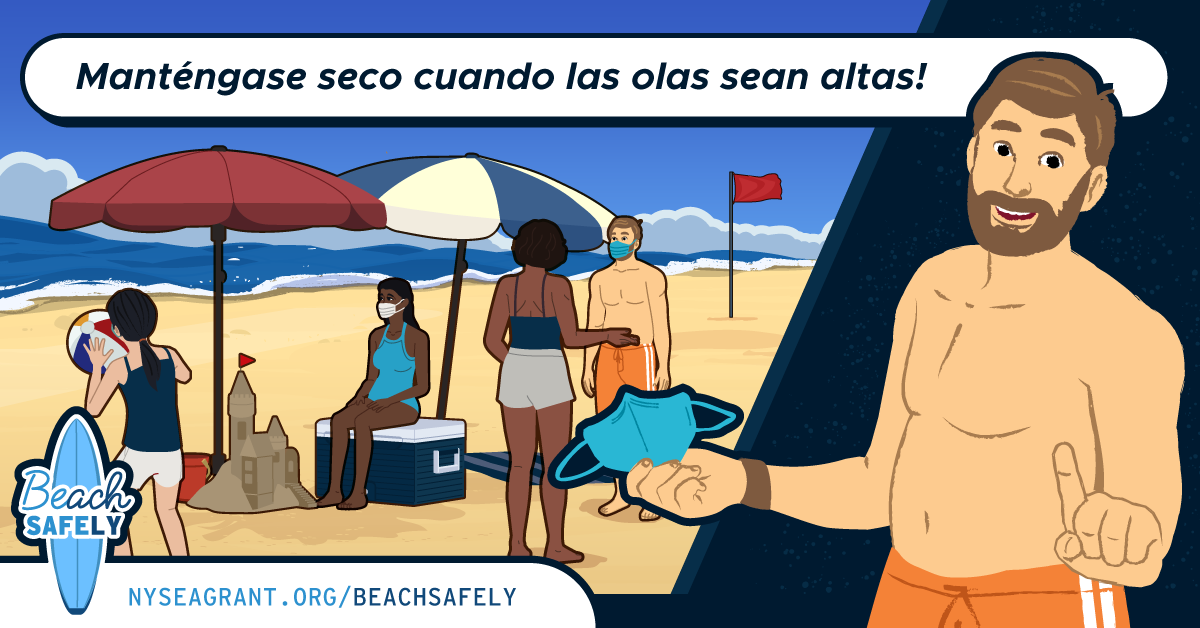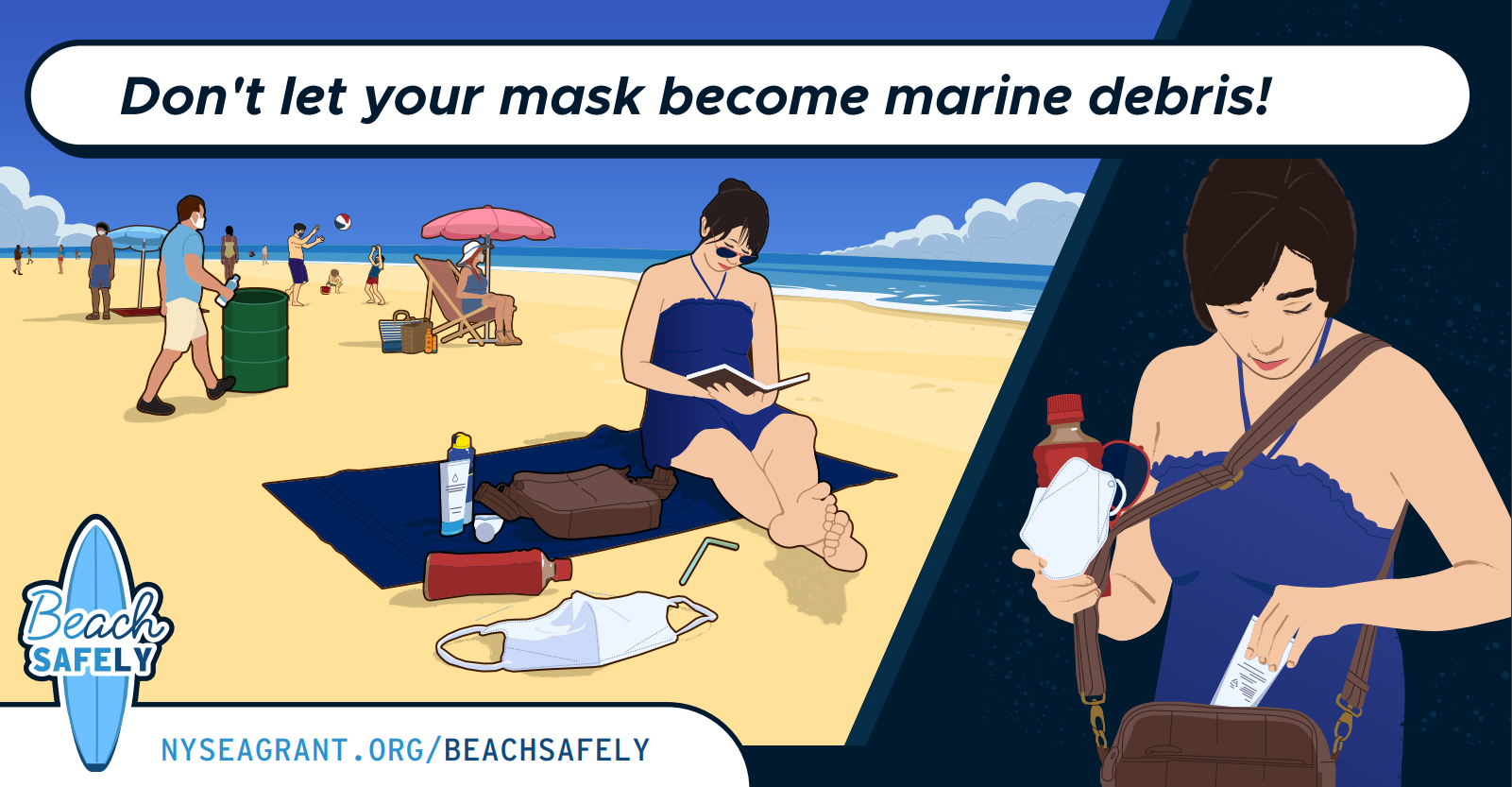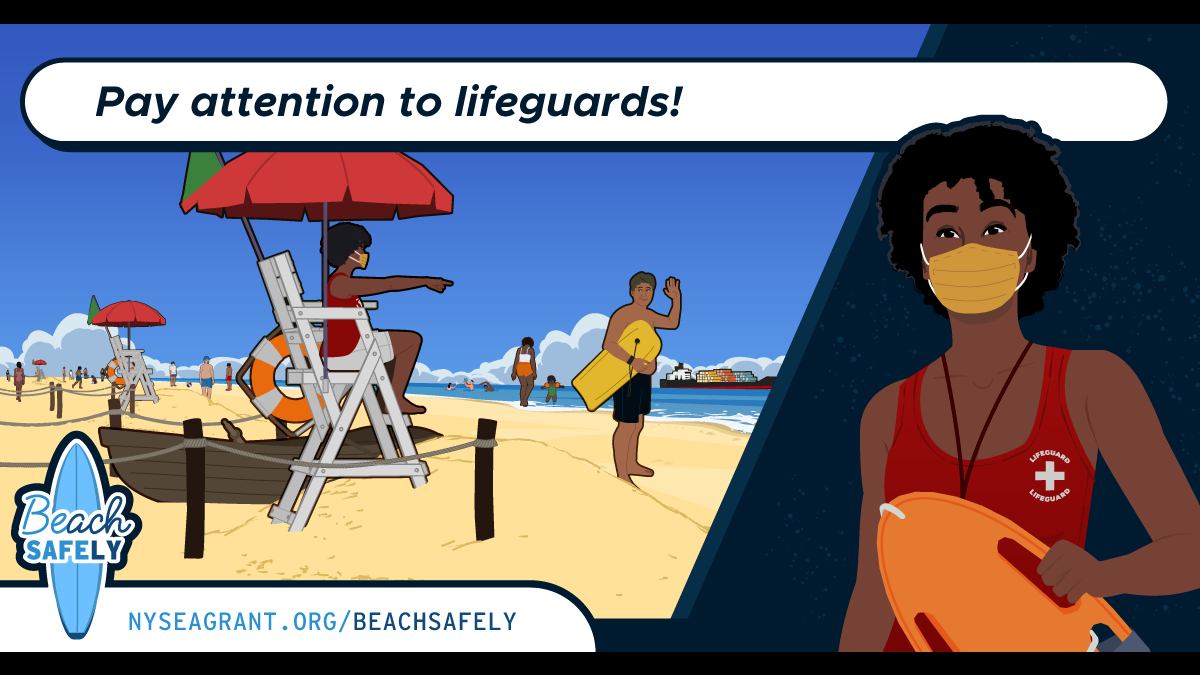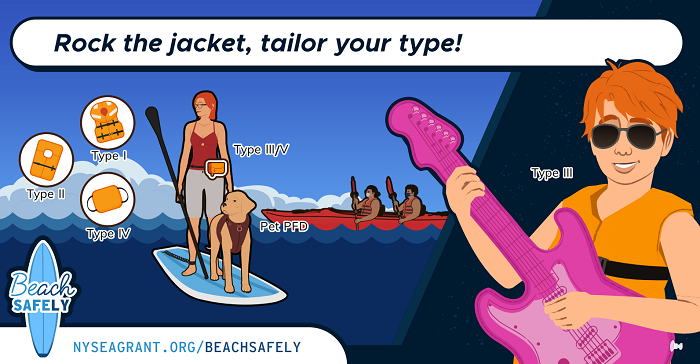“BEach SAFEly” Campaign – NJSGC’s Rapid Response to COVID-19
JULY 2022: This summer, New Jersey Sea Grant Consortium (NJSGC) and New York Sea Grant (NYSG) want you to enjoy the BEach SAFEly!
COVID-19 brings more considerations beyond the usual “beach safety and ocean hazards” messaging. Starting this month and continuing into September, our Sea Grant programs will debut a new social media graphic each week to remind beachgoers to stay safe while still having fun at the Jersey Shore and beyond!
For more information, please visit the NYSG “BEach SAFEly” homepage.
Week 1: Stay Social, Be Distant! | English PDF | Spanish PDF
This summer, the beaches are open and you should enjoy them! Just remember that you still need to practice social distancing – embrace your personal space.
Stay at least 6 feet apart from other beachgoers that you didn’t come with; this is about the average length of a surfboard, two boogie boards, a bit more than an beach towel length, or three beach chairs – you could even measure based on your beach umbrella pole!
When you’re walking around the beach, to and from the parking lot or other facilities, or if you can’t stay more than 6 feet apart from others, remember to wear your mask. Frequently wash or sanitize your hands – and if you feel sick, stay home.
###
Week 2: Break the Grip of the Rip! | English PDF | Spanish PDF
Rip currents are one of the deadliest beach hazards. They occur as ocean water moves swiftly away from the shore.
If caught in a rip, the most important thing is to remain calm! Wave or call for help, “flip” onto your back and “float” rather than fighting against the current, and “follow” as it takes you to calmer waters where it dissipates and you can swim safely to shore.
If you notice someone else in danger, do not try to save them yourselves. Instead, maintain visual contact with the victim and send another beachgoer to get help, find a lifeguard, or call 9-1-1.
Find more information and material on NJSGC’s Rip Current Awareness webpage.
###
Week 3: Shoreline Rescue | English PDF | Spanish PDF
Many rescuers often become victims themselves, so if you notice someone in the water who needs assistance, follow these steps to help them while still staying safe yourself!
Act quickly, maintain sight of the victim, call for help or send someone else to get help, and (if possible) throw a floatable to them.
Common beach items that float include life jackets, coolers, boogie boards, surfboards, or pool toys.
Remember to enjoy the beach safely this summer by (1) avoiding physical contact with others (outside of those who you came with); (2) bringing and wearing your mask when you’re not sitting on your towel or in the water; (3) washing your hands; and (4) if you feel sick, stay home!
###
Week 4: Grab your sunscreen and sanitizer! | English PDF | Spanish PDF
The sun emits ultraviolet (UV) rays which are powerful enough to damage your skin and result in sunburn. The National Weather Service (NWS) issues a daily UV Index, a number ranging from 0-10; the higher the number, the greater amount of skin damaging UV radiation. Make sure to check this number and the appropriate protective actions before you spend a day outside.
When you do go outside, use a broad spectrum sunscreen to protect against UV rays, which contribute to premature aging, sunburn, and skin cancer. Apply generously and reapply every two hours and/or when you get out of the water.
This summer, in addition to protecting yourself from the sun, remember to protect yourself from COVID-19. Don’t forget to bring any extra safety precautions such as your mask, which should be worn when you can’t social distance, and plenty of hand sanitizer to apply often.
To increase effectiveness, your hand sanitizer should be at least 60% alcohol and wipe any sand or sunscreen off before applying.
Remember to enjoy the beach safely this summer by (1) avoiding physical contact with others (outside of those who you came with); (2) bringing and wearing your mask when you’re not sitting on your towel or in the water; (3) washing your hands; and (4) if you feel sick, stay home!
###
Week 5: Be a water watcher! | English PDF | Spanish PDF
While enjoying the beach, please remember that there are many hazards to consider – a nice day can quickly turn dangerous or even deadly!
Be aware of your surroundings and pay attention to those you are with, particularly small children or those who are poor swimmers. By doing this, you can react more quickly if a situation were to occur.
###
Week 6: Stay dry when waves are high! | English PDF | Spanish PDF
Waves form as the wind interacts with the ocean’s surface, so the stronger the wind becomes, the larger the waves get! Even smaller waves can be very powerful and easily knock over a wader or toss around and disorient a swimmer.
If you do go into the water while at the beach, always swim near a lifeguard. And if you notice someone in trouble, remember to call for help rather than attempting to perform a rescue yourself.
But – as illustrated in “Stay dry when waves are high!” – if the waves look high, enjoy a day playing on the sand.
The National Weather Service issues daily surf forecasts, so always be sure to check your local report before you head to the beach. And if the waves look high, enjoy a day playing on the sand and taking beautiful snapshots of the sea!
###
Week 7: Don’t let your mask become marine debris! | English PDF | Spanish PDF
Marine debris, as defined by NOAA’s Marine Debris Program, is any manufactured solid material that is intentionally or unintentionally disposed of or abandoned into the marine system. Marine debris can originate at the beach or make its way to the ocean from inland areas being carried by water or wind; it persists in the marine environment and causes harm to plants and animals.
If you remove your personal protection equipment, be alert and aware that it doesn’t blow away and land in the ocean. Make sure to always “carry in and carry out” and dispose of your trash in appropriate receptacles. When at the beach, please only leave your sandy footprints behind!
###
Week 8: Pay Attention to Lifeguards! | English PDF | Spanish PDF
Lifeguards work to protect beachgoers from ocean-related hazards, such as rip currents. In fact, according to the United State Lifesaving Association (USLA), the chance of drowning at a lifeguarded beach is approximately 1 in 18 million.
Therefore, it’s important to always swim near a lifeguard and listen to their warnings!
When you arrive at the beach, check with a lifeguard if you are unsure where you can or if it is safe to swim.
Flags may be flown at the beach that express different hazards or designate swimming areas that may change from time to time; if you are unsure of their meanings, ask a lifeguard!
For more useful tips, please see USLA’s Top 10 Beach and Water Safety Tips.
Several Jersey Shore towns are extending the summer season for 2020. Check out this growing list of participating beach communities from 94.3 “The Point.”
###
Week 9: Rock the Jacket, Tailor the Type! | English PDF | Spanish PDF
Life jackets are required when enjoying various water recreational activities such as boating, kayaking and paddleboarding!
Life jackets are available in different shapes, colors, and sizes; each tailored to the type of activity – check out U.S. Coast Guard’s “Wearing Your Life jacket” and National Safe Boating Council’s “Wear It” to learn more. Be sure to read your life jacket’s label to assure that it is appropriate for your size and activity. Life jackets are made for adults, children, and even pets!
Also make sure your life jacket is US Coast Guard approved and know your state laws – Boat U.S. Foundation’s “Life Jacket Requirements (By State)”.
Remember to enjoy the beach safely this summer by (1) avoiding physical contact with others (outside of those who you came with) – stay at least 6 feet away from fellow beach goers and swimmers; (2) bringing and wearing your mask when you’re not sitting on your towel or in the water. however, masks should not be worn in the water, as they can be difficult to breathe through if they get wet; (3) washing/sanitizing your hands; and (4) if you feel sick, stay home!
###
